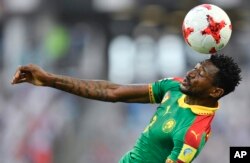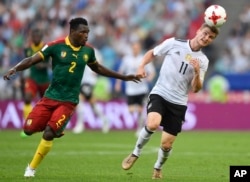Professional football players are still not getting properly checked for concussions, despite a pledge by the sport's governing body. That was obvious from a review of footage from the games in FIFA's 2014 World Cup, the international men's football championship held every four years.
The review, published in the Journal of the American Medical Association, found that out of 81 head collisions there were only 12 assessments that fit the minimum requirements.
Co-author Michael Cusimano, a neurosurgeon at St. Michael's Hospital in Toronto, told VOA, “There were only two collisions [where] I could be happy and confident that a proper assessment was actually done.”
According to the 2012 Consensus Statement on Concussion in Sport, of which FIFA was a signatory, players showing any sign of concussion should immediately be withdrawn from play and assessed by a health care professional on the sideline. But players in the World Cup only received that full assessment 15 percent of the time.
More than half of the time, an assessment was done on the field or by a referee or another player. And 26 percent of the time, they received no assessment at all, despite showing as many as three signs of concussion. Those symptoms include being slow to get up, disorientation, obvious disequilibrium, unconsciousness, seizure-like movements, and head clutching.
The impact of concussions can accumulate over years and may lead to trouble with memory, attention, depression, anxiety, and early onset dementia. In rare cases, repeated blows to the head over a short period of time, even mild ones, can lead to death.
A concussion ignored
There was obviously something wrong with Christoph Kramer during the final game of the World Cup. The German player was struck on the side of his head by a shoulder and thrown to the ground. Following a brief assessment on the pitch, he was returned to play, despite showing at least three signs of concussion. After 13 minutes of strange, confused behavior, he was removed from the game.
A referee later told the Gazzetta dello Sport, “Shortly after the blow, Kramer came to me asking: ‘Ref, is this the final?’” The referee told teammates, but Kramer continued to play.
“Had he been injured to his knee and couldn't walk there would be no doubt that he would have been taken off,” Cusimano said, “so why are we treating people with brain injuries any different than people who have, say, a leg injury?”
In response, FIFA soon created a policy to allow referees to stop play for as long as three minutes, so that players can receive an on-pitch assessment by health care personnel. But it is only at the discretion of the referee. This is not enough for Cusimano. He points out it was an on-pitch assessment that failed to catch Kramer's apparent concussion, and it takes at least seven minutes to properly diagnose the condition. So he wants to see mandatory assessments on the sidelines, just as the 2012 Consensus advises.
'Whole world is watching’
FIFA declined a request to speak with VOA, but shared a written statement highlighting their recent rule change, and their participation in the most recent International Consensus Conference on Concussion.
“Protecting the health of football players is and will remain a top priority in developing the game,” it said.
Researchers decided to analyze the World Cup because of the size of the audience. Over a billion people tuned in. That means that the World Cup provides an opportunity to set an example for how to handle concussions. They hope that better policy at the premier sporting event might not just protect those playing in the World Cup, but those playing in little leagues too.
“The whole world is watching,” said Dr. Cusimano. “FIFA has all the ability to do this properly.”






